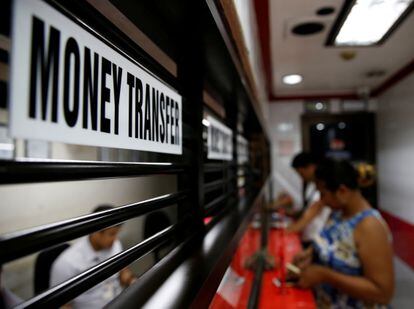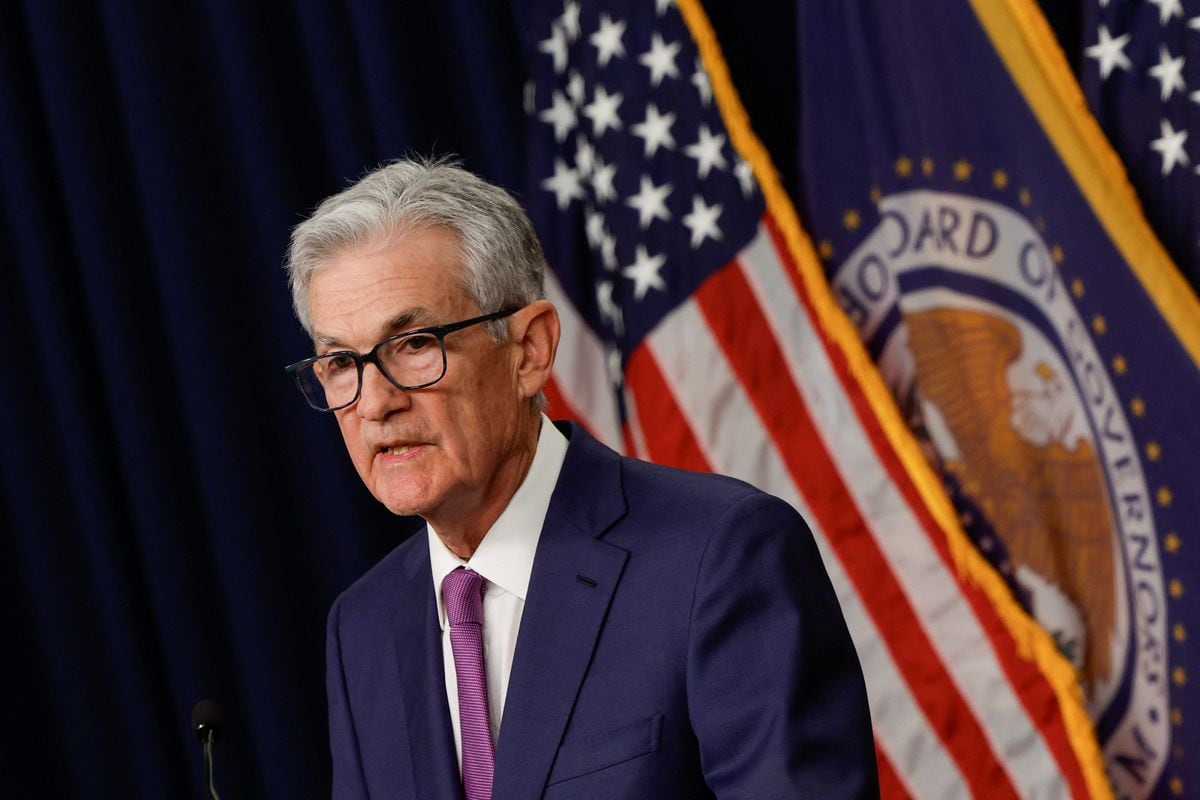Two people receive, in Manila (Philippines), remittances sent by their emigrated relatives.Eloisa Lopez (Reuters)
In view of the fact that her sister, an employee of a restaurant in Tegucigalpa (Honduras), had lost her job in the harshest months of the health crisis, Cecy Zerón, 35 years old and resident in Spain for seven, reduced to the maximum their expenses. The goal: to increase the amount of money he sent to his family. Unlike hers, she was able to maintain her income in the worst of the crisis, without even falling into ERTE. "My sister is the one who helps my mother, and without her salary they had practically no income ... Although it is not easy for me, whenever I can send a little more I do it. But during the pandemic, even more so ”, explains Zerón, who works as a domestic worker, caregiver for the elderly and in the kitchen of a restaurant in Madrid. Everything at once.
The coronavirus crisis has been an economic blow of great proportions throughout the world, but much more so for middle- and low-income nations: there it threatens to ruin several years of development. In the midst of a gale, however, remittances have held up unusually well. Infinitely better, in fact, than anyone expected: for many of these countries, mostly Latin American and Asian, it has been — in the words of Ana Revenga, of the Brookings Institute — a true “lifeline” at the most critical moment.
The total value of money sent by migrants around the world is on track to grow 7.1% in 2021, according to the latest data from the World Bank. In 2020 - in the midst of a global recession - it only fell by 1.7%, removing the scarecrow from the most apocalyptic forecasts, including those of the Washington-based lender itself, which even predicted a 20% drop. One piece of information perfectly synthesizes the importance that remittances have acquired in the emerging world: they are already more important than the sum of foreign direct investment and official development aid.
"It has been a lifeline, a huge input of resources for millions of families and for many countries when they needed it most: in the midst of the collapse of world trade and tourism," says Alejandro Canales, researcher at the University of Guadalajara (Mexico) and author of several studies on remittances. It is, he says, an especially clear phenomenon in Mexico and India, and in the Central American Northern Triangle: Honduras, Guatemala and El Salvador.
What has kept the remittances flame alive when all the rest of the economic dominoes fell one after another? Far from pointing to a single factor, all the specialists consulted for this report point to a host of explanations: from family solidarity at a critical moment - as the case of Zerón attests - to the rapid recovery of labor markets in rich countries , going through the quasi-universal checks to help workers in the United States or ERTE and other programs to guarantee labor income in Spain and the rest of Europe.
“When the countries of origin are bad, the emigrants tend to send more money. That is exactly what has happened during the pandemic, and it is what has allowed remittances to have played this stabilizing role for emerging countries when they had less space for fiscal policy, "explains Revenga, who endorses point by point what Zerón has expressed . A willingness to help that, both this year and last, has been more important than ever: not only because of the pandemic, but also because of its temporal coincidence with natural disasters such as the hurricanes that hit Honduras or the floods in Bangladesh, two of the large recipient countries.
"The overall result has surprised us all," acknowledges Dilip Ratha, head of analysis for remittances issues at the World Bank, who provides an additional explanation: the return - temporary or permanent - of tens of thousands of migrants to their countries of origin. origin with savings in your pocket.
"It may be something temporary and difficult to quantify, but it has also been relevant," he says on the other end of the phone.
General trend
There is a key fact: in no large recipient of remittances have shipments fallen. Not in India, not in Pakistan, not in Mexico, not in the aggregate of the Central American countries. "The only declines have been in developed countries, such as Germany or France, whose nationals have the Persian Gulf as their main destination, to work in the oil industry, which collapsed in 2020," adds Canales. And the social relevance of this decline is minimal for two reasons: because the weight on the GDP of these countries is negligible, and because the families of these workers have a greater cushion of savings and depend much less on shipments than emerging countries .
The boom has been especially important in shipments to Mexico and Central America, largely due to the good performance of employment in the United States and the generous aid deployed to the North American giant in the most acute phase of the crisis. “There, the employment rate of Mexicans and Central Americans has evolved even better than the average and has been even above pre-crisis levels for some time. It has been a very positive period for them, in part thanks to the fact that they are in the sectors where labor is most scarce, ”concludes Jesús Cervantes, director of economic statistics and coordinator of the Remittance Forum of the Center for Latin American Monetary Studies ( Cemla). This tightness in the labor market, he says, may prolong this golden age of remittances a little longer."But they will necessarily have to slow down in the coming years: current growth rates are hardly sustainable."






/cloudfront-eu-central-1.images.arcpublishing.com/prisa/3FI7KHR4GI7ABUOQDZ3ENWASZQ.jpg)


